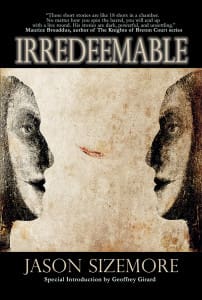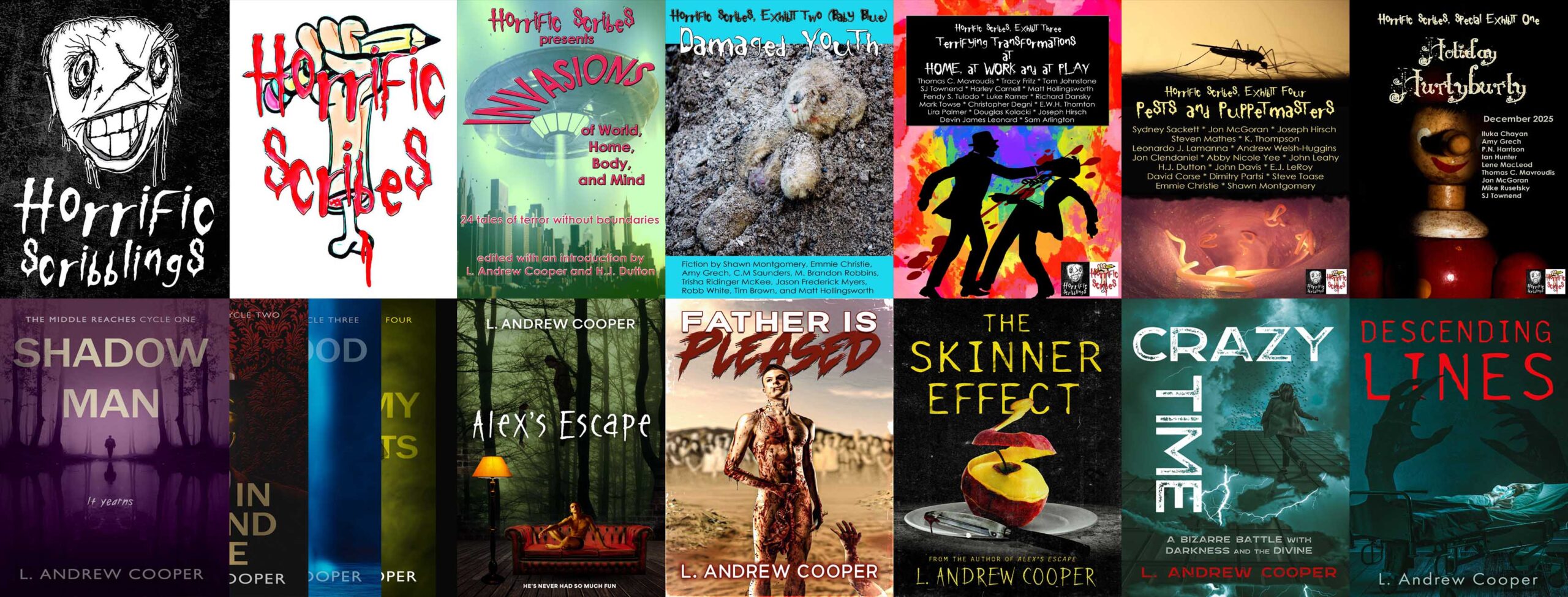Jason Sizemore’s Irredeemable is tricky because, particularly if you skip the title, you could pick it up and get swept up in each of the 18 tales’ ways of delivering fast, hard-hitting narrative. Not noticing the passage of time, you could put it down, think back and ponder which story was your favorite read, and then notice that you went so fast you didn’t linger long enough to think about the implications of what may or may not deserve redemption and punishment in each tale….

As I moved through the collection, and certainly when I finished it, I realized that the book sets up an overarching distinction between retribution, shown in many horrible forms, and true justice, which, much like Flannery O’ Connor’s good man, is hard to find. Mr. Sizemore comments on this distinction quite eloquently in our interview.
The result of this overarching distinction, then, is that many stories raise questions rather than delivering answers, so I must respectfully disagree with the book’s introduction when it claims “Jason’s characters don’t live in some existential universe where there is no value, meaning, or moral structure. There ain’t no Lovecraft, Kafka, Burgess, Vonnegut, or Palahniuk brand of grotesque here.” Bracket my disagreement with the pairing of these two sentences, and I’ll say (1) Sizemore’s work is far too compelling to offer simple, easily discernible moral structures as solutions for the morally compromised worlds he displays, and (2) In two of my favorite stories, the super-creepy short short “Little Digits” and provocative dark sci-fi “Mr. Templar,” I’d say Sizemore approaches brilliance while he also treads nearest both Kafka and Vonnegut.
In part due to ambiguity resulting from the absence of easy moral structures, some of the stories deal with sensitive issues in ways that might disturb some readers. In particular, “Faithless” deals with sexual outsiders in a conservative community of faith in a way that shows conflicting attitudes without overtly pointing a finger at what is right or wrong, who has or lacks true faith, and which acts are and aren’t redeemable. The risk is that the story could seem to confirm views that Sizemore means to challenge (see the interview), but by capturing a prism of emotional authenticity free of a polemic’s artificial clarity, “Faithless” makes the risk worthwhile. Sizemore seeks a similar balance in “Hope” and “For the Sake of Pleasing,” offering kick-ass women who fight against evils that seem like indictments of patriarchy, but at the same time semi-superfluous descriptions of the heroines’ nipples might prove counterproductive to some readers. Sizemore is working within a tradition–some of the imagery reminds me of Heavy Metal–and while the tradition’s historical baggage is occasionally cumbersome, his writing’s intelligence stays ahead of it most of the time.
The writing shines most darkly for horror fans, though, when Sizemore turns from clever genre-b(l)ending to purer horror stock. Hard-core horrorhounds will not be disappointed by “The Dead and Metty Crawford,” which involves a kind of torture that Mario Bava only whispers to me about in a film from the 60s (I won’t say which one). “The Sleeping Quartet” has a claim to sci-fi (um, Frankenstein has been clouding that issue for almost 200 years), but it appeals to me as a classic tale of horror, conspiracy, and hallucination.
Since Sizemore and I share the distinction of being Southern authors, I will close with noting that he self-reflectively folds his work into Southern Gothic and carves space for himself and Appalachia in particular within that tradition, offering a regional voice that will register differently to different ears. In the collection’s final story, “Yellow Warblers,” one of Sizemore’s characters comments, “‘Appalachian cultural history shows a tendency toward xenophobia.'” People from outside this region will know the opposite is true as well: aliens (literal or figurative) to this region tend to fear it, and the stories in Irredeemable both capitalize on and castigate that fear. If you hear the sort of voice emerging in Sizemore’s work, and you judge the meaning-layered accent like so many outsiders do and presume that the speaker lacks intelligence and insight–you may be irredeemably stupid. Read the book. Watch your ass. This guy knows what he’s talking about.


Comments are closed.